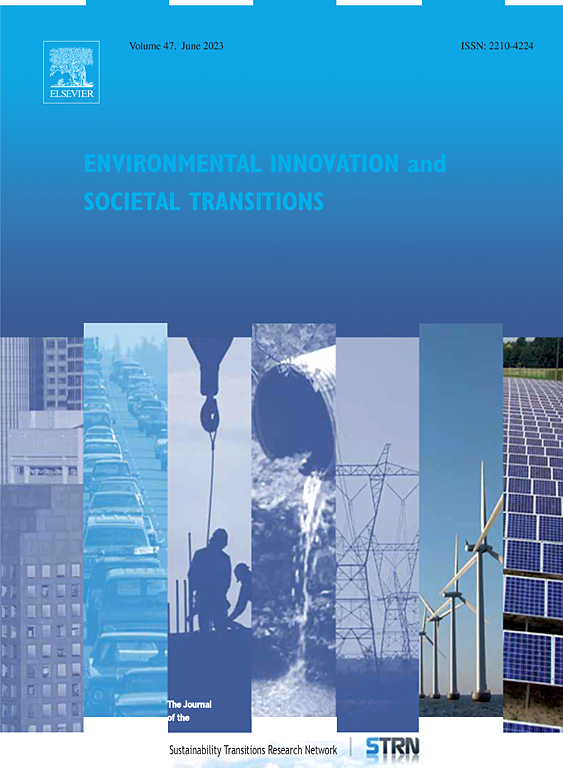Organising the subjects of responsible consumption: Analysing the locus of responsibility for transitions in the UK food sector (2007-2021)
IF 6.1
2区 经济学
Q1 ENVIRONMENTAL SCIENCES
Environmental Innovation and Societal Transitions
Pub Date : 2025-06-12
DOI:10.1016/j.eist.2025.101022
引用次数: 0
Abstract
This paper considers the phenomenon of responsible consumption, which we approach as an organisational field. In doing so, we contribute analytic guidance for the study of both consumption and responsibility in sustainability transitions. Our analysis draws on three qualitative longitudinal case studies of ostensibly ‘consumer-facing’ policies and initiatives for healthy and sustainable food: carbon labelling, food waste campaigning, and sugar taxation. In each case we explore the mechanisms by which ‘consumers' are responsibilised and trace the effects of these over time. We demonstrate that responsibilisation is a dynamic and ongoing process that cannot be reduced to the unidirectional transfer of responsibilities from organisations to individuals. We also link shifts in the relationships between, and responsibilities of, different actor groups to tangible changes in the configuration of food consumption practices. Taken together, we argue that the enactment of responsible consumption is not contingent on the success of efforts to responsibilise individual consumers. To conclude, we consider the implications of our analysis for theoretical and practical understandings of sustainability transitions.
组织负责任消费的主题:分析英国食品部门转型的责任轨迹(2007-2021)
本文考虑了负责任消费现象,我们将其作为一个组织领域来研究。在此过程中,我们为可持续转型中的消费和责任研究提供了分析指导。我们的分析借鉴了三个定性纵向案例研究,表面上是“面向消费者”的健康和可持续食品政策和举措:碳标签、食物浪费运动和糖税。在每种情况下,我们都会探索“消费者”负责的机制,并追踪这些机制随时间的影响。我们证明责任是一个动态和持续的过程,不能简化为从组织到个人的单向责任转移。我们还将不同行为者群体之间的关系和责任的变化与食品消费实践配置的实际变化联系起来。综上所述,我们认为,负责任消费的制定并不取决于个人消费者负责的努力的成功。最后,我们考虑了我们的分析对可持续性转变的理论和实践理解的影响。
本文章由计算机程序翻译,如有差异,请以英文原文为准。
求助全文
约1分钟内获得全文
求助全文
来源期刊

Environmental Innovation and Societal Transitions
Energy-Renewable Energy, Sustainability and the Environment
CiteScore
13.60
自引率
19.40%
发文量
90
审稿时长
56 days
期刊介绍:
Environmental Innovation and Societal Transitions serves as a platform for reporting studies on innovations and socio-economic transitions aimed at fostering an environmentally sustainable economy, thereby addressing structural resource scarcity and environmental challenges, particularly those associated with fossil energy use and climate change. The journal focuses on various forms of innovation, including technological, organizational, economic, institutional, and political, as well as economy-wide and sectoral changes in areas such as energy, transport, agriculture, and water management. It endeavors to tackle complex questions concerning social, economic, behavioral-psychological, and political barriers and opportunities, along with their intricate interactions. With a multidisciplinary approach and methodological openness, the journal welcomes contributions from a wide array of disciplines within the social, environmental, and innovation sciences.
 求助内容:
求助内容: 应助结果提醒方式:
应助结果提醒方式:


